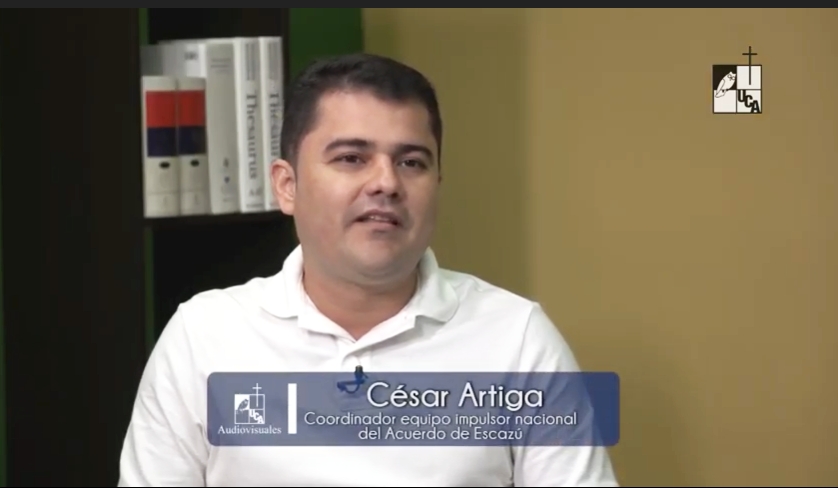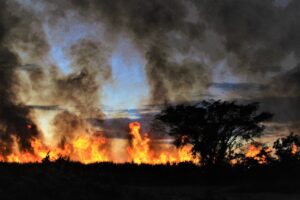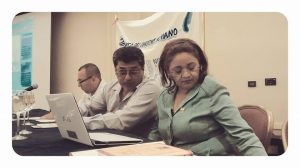Defending Natural Resources, Human Rights
Cesar Artiga on the Escazu agreement
On September 24, President Nayib Bukele confirmed that El Salvador would not sign the Escazú Agreement, considering that some of its articles do not adapt to the Salvadoran reality. Now, the team promoting the treaty, begins meetings with deputies of the Legislative Assembly to seek adherence through this state body.
Focos spoke with César Artiga, general coordinator of the Driving Team of the Escazú Agreement in El Salvador, to find out his opinion on the statements of President Bukele and the need for the country to join this project.
FIRST. What is the Escazu Agreement?
The Escazú Agreement is a new treaty that deepens the link between environmental protection and human rights in Latin America and the Caribbean. It has the potential to reduce the conflicts that lead to the murders of so many environmental defenders in the region.
At its core, Escazú sets standards for informed participation in environmental decisions and access to environmental justice. The agreement guarantees the public’s right to information on environmental issues, while at the same time ensuring their right to informed participation in the environmental approval process for investment projects. The agreement also eliminates obstacles to environmental justice and requires support for people or groups in vulnerable situations.
On Bukele’s reasons not to sign, Artiga says:
… there is a deliberate interest of this administration to definitively abandon the environmental dimension in public management, (…) We did not hear the president talk about the environment. We saw a very weak Minister of the Environment, with little effective presence and with a regrettable role in terms of environmental protection.
The message is that El Salvador is not committed to advancing democracy and environmental governance, that it is not interested in protecting the environment in the context we are living in, in a context of a pandemic, where there are many studies of the international scientific community stating that there is an indivisible relationship between the degradation of ecosystems, the accelerated loss of biodiversity, with all the situations that are affecting the health of humanity. In other words, the virus as such is also the product of the neglect that states have made of environmental protection at a global level.
(…)
The country is sadly lagging behind and this government has decided to prioritize investment. It has decided to keep the privileges of the economic elite of El Salvador, especially the construction sector. He said it clearly and what it reveals is who they are, who is behind this government. Behind every administration there are always interests. In this administration is the corporate interests of the construction company. At least, we consider that he finally made an official position known…
What does the Escazú Agreement mean in terms of access to information, citizen participation and environmental justice?
In terms of information, in El Salvador, we have a Law on Access to Public Information (LAIP) that is quite good, in terms of its purpose, however, this law does not have specific provisions on environmental matters, for which the Escazú Agreement would be directly applied to the LAIP. (…) the Treaty of Escazú would allow to expand the legal grip of the country. Signing and ratifying the agreement would give that possibility, that it now has a concrete application in environmental matters that is not stipulated in the law of the country.
The second element is public participation. (…) the Escazú Agreement establishes procedures, mechanisms to strengthen everything that the country already has and expand to new figures and processes of public participation. The agreement establishes the pro person approach, that is, everyone has the right and the duty to participate in all stages, in all areas and at all levels, that means that people must be consulted from the beginning of a project, not when it is already in the evaluation phase, when it has already gone through an entire stage of progress presentations and there is much work already done. We do not have that in our legislation and we cannot see the problems and conflicts that exist at any given time, such as with the dam that is being built on the Sensunapán river.
(…)
…The Escazú Agreement would be a robust instrument to (…) guarantee access to justice for people. Ultimately it is about that, that we break with the impunity schemes that have historically prevailed.
At this time, a person can even file an oral, written complaint and appeal to the environmental courts. However, with Escazú, the State would have the burden of proof. What does this mean? That if a person wants and considers that a project threatens the guarantee of their environmental right, or that it threatens the integrity and health of the ecosystem, this person can denounce and activate the Agreement and the State must demonstrate to that person that that project will not have any effects, nor that it will be the threat that the plaintiff identifies. It is not up to the person to obtain the evidence.
(…)
These elements of the treaty will strengthen the institutional framework, the framework of national public policies and will expand the legal basis that our law does not contemplate and there arises the fourth central aspect of Escazú: the protection of environmentalists.
In El Salvador the figure of a defender is not recognized by the law. For example, a person who is persecuted for their work in defense of the environment files a complaint with the Public Prosecutor’s Office or in the competent instances and, since the figure of a defender does not exist, it is processed as it is established by the Criminal Code, as life threat. It is not recognized that this is a person who is defending natural assets. This legal vacuum allows there to be a framework of null protection for defenders and in this case for environmental matters in the country. If Escazú were approved and implemented, then it would automatically become the law and the State would have a specific mandate to take measures, mechanisms, and protection systems for defenders and must adapt its legal framework to recognize them.
Do you know of current cases where any of these three standards have been violated? Even attacks on defenders …
Among the most recent, I could at least mention three: that of the Sensunapán River. This is a very specific case of how the right to participation in the decisions of communities and individuals has been violated. The other that is very key is that of Cuisnahuat, including the conflict that exists right now between the Mayor’s Office and the indigenous peoples of Cuisnahuat who are demanding that this project not be built. However, the logging was done without authorization from the Ministry of Environment (MARN) and without the people being able to comment if they agreed with it. The mayor’s office says that there were only ten trees, it really was a slightly larger area, but regardless of how many trees there were, in a country like ours (that) the UN and others already say that it is at risk of becoming a desert in the next decades, we should advance in the protection of our forests, not in logging…
The other that we consider is a conflict that it’s very silent but very dangerous and in which there is a lot of persecution of defenders in El Salvador opposing the advance of the sugar cane monoculture. There are many cases in Tecoluca, Sonsonate and Jiquilisco, to mention a few where the monoculture of sugar cane has even invaded protected natural areas (ANP), cutting down mangrove swamps. It is not only surpasing the agricultural frontier but also the extended use and without any regulation of agrochemicals to ripen the cane. This maturing agent is lethal, causes chronic kidney failure, and who compensates for these cases? Who prevents that damage? Nobody.
The Ministry of Agriculture and Livestock (MAG) does not regulate it in any way; the MARN does not regulate the intensive use of water for irrigation of the sugar cane and the contamination of the springs and the people are in total abandonment. The State has abandoned the communities that are surrounded by the sugarcane monoculture…
Read the full interview (IN SPANISH) here.



